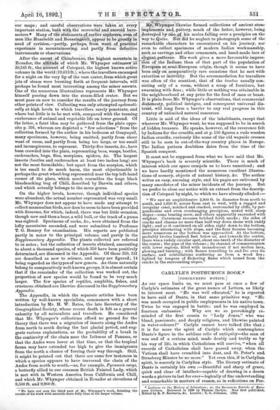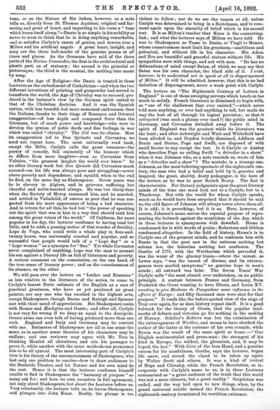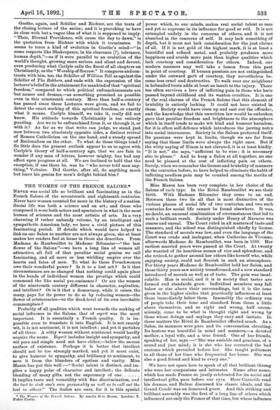As oar space limits us, we must pass at once
a few of Carlyle's estimates of the great names of Letters, as likely to interest most. "He was well educated," he is reported to have said of Dante, in that same primitive way. "He was much occupied in public employments in his native town.. Twice be was engaged in battle; and he was employed in fourteen embassies." Why are we so provokingly re- minded of the first cousin to "Lady Jones," who was bland, passionate, and deeply religions, and likewise painted in water-colours P" Carlyle cannot have talked like that ; it is far more the spirit of Carlyle which contemplates Dante's figure in the sublime relic of antiquity—the man of woe and of a serious mind, made doubly and trebly so by his way of life, in which Catholicism will survive, "when all records of Catholicism shall have passed away, when the. Vatican shall have crumbled into dust, and St. Peter's and. Strasburg Minster be no more." Yet even this, if in Carlyli'an spirit, is scarcely in Carlylian style. The literary estimate of Dante is certainly his own :—Beautiful and sharp of grace, quick and clear of intellect—capable of drawing in a dozen words a picture to last for ever—logically of fine understanding and remarkable in matters of reason, as in reflections on For- Lectures on the History of Literature; or, the Successtoe Periods of ffwro. pima Culture. Delivered in 1838 by Thomas Carlyle. New first published. Edited by IL P. Karkaria, ke. London: T. G. Johnson. 1892.
tune, or on the Nature of Sin (taken, however, as a note tells us, directly from St. Thomas Aquinas), original and far- seeing and great of heart, and imparting to his verse a "time which hums itself along,"—Dante is so simple in his nobility as never to seem to think that he is doing anything remarkable, and so satisfies Carlyle's canon of genius, and towers over a Milton and his artificial angels. A great heart, insight, and song are the three hall-marks of the genuine poems at all times and places. As the Germans have said of the three parts of the Divina Commedia, the first is the architectural and plastic part, as of statuary ; the second is the pictorial or picturesque; the third is the musical, the melting into music by song.
After the Age of Religion—for Dante is treated in these Lectures as the embodiment of Catholicism—and when the two different inventions of printing and gunpowder had served to transform the world, the Age of Chivalry was to succeed, pro- duced in the lecturer's view by the German spirit united to that of the Christian doctrine. And it was the Spanish nation, with less breadth but more sustained enthusiasm than the Italians, thanks to their tinge of Romance and Oriental -exaggeration—of less depth and composed force than the Germans, butt of much power and knowledge—who were to develop the system of noble deeds and fine feelings in war which was called "chivalry." The Cid was its climax. How its exaggeration led to Don Quixote and Cervantes, we need not repeat here. The most universally read book, except the Bible, Carlyle calls the great romance—the poetry of comedy, full eminently of the humour which so differs from mere laughter—even as Cervantes from Voltaire, "the greatest laugher the world ever knew." In no other literary work but Don Quixote did Cervantes much succeed—as his life was always poor and struggling—never above poverty and dependence, and squalid, when in the end he died, on the same day as Shakespeare. Seven years was he in slavery in Algiers, and in grievous suffering, but cheerful and noble-hearted always. He was but thirty-four when the Society of Mercy ransomed him, and he married, and settled in Valladolid, of esteem so poor that he was sus- pected from his mere appearance of being a bad character. And in return for all this, he had but "the power of speaking out the spirit that was in him in a way that should rank him among the great voices of the world." Of Calderon, far more popular in his day, the lecturer confesses to having read but little, and he adds a passing notice of that wonder of fertility. Lope de Vega, who could write a whole play in four-and- twenty hours, was universally courted and popular, and so successful that people would talk of a "Lope day" or a " Lope woman " as a synonym for "fine." Yet while Cervantes never complained of anything, Lope was the man to counsel his son against a literary life as full of bitterness and poverty. A curious comment on the consolation, on the one hand, of the true sense of literary power ; and on the consciousness of its absence, on the other.
We will pass over the lecture on "Luther and Erasmus" as less relative to the literature of the series, to come to Carlyle's honest Doric estimate of the English as a race of practical greatness, who have as yet produced no great painter, nor any one who has excelled in the highest arts, except Shakespeare, though Bacon and Raleigh and Spenser met with their meed of appreciation. But Shakespeare ranks with Homer and 2Esehylus and Dante ; and after all, Carlyle is not very far wrong if we deny an equal to the demigods. Greece alone can even talk of having produced more than one such. England and Italy and Germany may be content with one. Estimates of Shakespeare are all in one sense the same, as in another sense theories of his characters may be endless ; and one reviewer may agree with Mr. Tree in thinking Hamlet all chivalrous, and cite his passages to prove it, while another with the same methods can pronounce him to be all cynical. The most interesting part of Carlyle's view is his theory of the unconsciousness of Shakespeare, who had only one problem to resolve—how to draw audiences to the Bankside Theatre, and let Nature and his own mind do the rest. Hence it is that the lecturer confesses himself unable to find in Shakespeare the "harmony of purpose" so many ask for ; and here we own ourselves in fall agreement, not only about Shakespeare, but about the Lectures before us. Very reluctantly, the lecturer tells us, he leaves Shakespeare, and plunges into John Knox. Really, the plunge is too
violent to follow ; nor do we see the reason at all, unless Carlyle was determined to bring in a Scotchman, and to com- ment again upon the sincerity of belief which is his second text. It is as Milton's teacher that Knox is the connecting- link ; and what the lecturer says of Milton we have told. He was to Shakespeare as Tasso to Dante, or Virgil to Homer, whose consciousness must limit his greatness,—ambitious and polemical, and without life in his character. His Adam and Eve are beautiful and graceful statues without life. His sympathies were with things, and not with men. "He has no delineations of mind except Satan, of which we may say that Satan was his own character, the black aide of it. I wish, however, to be understood not to speak at all in disparagement of Milton." It will be admitted, however, that this is no bad imitation of disparagement, never a weak point with Carlyle.
The lecture on "The Eighteenth Century of Letters in England" is one of those sweeping surveys which touch on too much to satisfy. French literature is dismissed, to begin with, as "one of the shallowest that ever existed,"—which never told man anything, or ever had anything to tell, but made its way the best of all through its logical precision ; so that it extirpated (was such a phrase ever used ?) the public mind in Germany, and Cervantes dwindled away before it. The spirit of England was the greatest while its literature was the least ; and after Arkwright and Watt and Whitefield have been alluded to, and Dryden briefly dismissed, Addison and Steele and Sterne, Pope and Swift, are disposed of with small favour to any except the last. Is it Carlyle or Anstey who describes Pope as calling Swift "a driveller in a show," when it was Johnson who, as a note reminds us, wrote of him as a "driveller and a show "? The mistake is a strange one. Johnson, as the most believing spectacle of the eighteenth cen- tury, the man who had a belief and held by it, genuine and inspired, the great, shabby, dusty pedagogue, is the hero of the lecture, as he was to poor Scotch Bozzy. The fact is characteristic. For literary judgments upon the great literary minds of the time one must look not to a Carlyle, but to a Thackeray. But with the world for whom Carlyle speaks, much as he would have been surprised that it should be said so, the odd figure of Johnson will always tower above them all. It is odd ; it is provoking; but it is so. Here, however, of course, Johnson's name serves the especial purpose of repre- senting the bulwark against the scepticism of the day, which in these lectures is synonymous with downfall. Hume is condemned for it with words of praise ; Robertson and Gibbon condemned altogether. In the field of history, Hume's is to Carlyle one of the greatest minds, and he contrasts him with Dante in that the poet saw in the universe nothing but solemn law, the historian nothing but confusion. The Goethe of 1775, with the Wertherism which pervaded it, was the worst of the gloomy times,—where the unrest, as Lewes says, "was the unrest of disease, and its extrava- gances were morbid symptoms," no genuine hope in men's minds ; all outward was false. The Seven Years' War Carlyle calls "the most absurd ever undertaken, on no public principle. A contest between France and Germany, from Frederick the Great wanting to have Silesia, and Louis XV. wanting to give Madame de Pompadour some influence in the affairs of Europe : and fifty thousand men were shot for that purpose." It reads like the before-quoted view of the siege of Troy over again, for so does history repeat itself. It is a good bulwark for the theory of Green, that the popular land- marks of defeats and victories go for nothing in the making of History. Schiller's Robbers was but the culmination of the extravagances of Werther, and seems to have shocked the author of the latter at the outcome of his own crusade, while Byron was the result of the same spirit at home :—" Our English sentimentalist and prose-man : the strongest of his kind in Europe, the wildest, the gloomiest, and, it may be hoped, the last." With Gotz of the Iron Hand, and a genuine esteem for his manfulness, Goethe, says the lecturer, began life anew, and struck the chord to be taken up again by Walter Scott and others. It was a kind of revival of Hope and Chivalry, while the French Revolution, so in- corporate with Carlyle's name to us, is in these Lectures summarised as "a great outburst of the truth that this world was not a mere chimera, but a great reality." Scepticism was ended, and the way laid open to new things, when, by the grand universal suicide named the French Revolution, the eighteenth century terminated its worthless existence. Goethe, again, and Schiller and Richter, are the texts of the closing lecture of the series; and it is provoking to have to close with but a vague idea of what it is supposed to imply. *" Thou, Eternal Providence, wilt cause the day to dawn," is the quotation from Richter with which it terminates. It seems to trace a kind of evolution in Goethe's mind—" in some respects like Shakespeare, in his clearance [?], tolerance, human depth,"—as if it were parallel to an evolution of the world's thought, growing more serious and silent and devout, even producing what Carlyle calls the finest of all chapters on Christianity, as the "Worship of Sorrow." It compares andeon- trasts with him, too, the Schiller of William Tell as against the Schiller of The Robbers, and ends with the expression of the lecturer's belief in the attainment for mankind of that "spiritual freedom," compared to which political enfranchisements are 'but names and dreams,—as something promised as possible even in this nineteenth century. More than half-a-century has passed since these Lectures were given, and we fail to detect the exact working of this spiritual freedom, or exactly what it means. Carlyle himself, we take it, really did not know. His attitude towards Christianity is too entirely puzzling. Are we to be enfranchised from it, or through it, or with it ? As far as we that write can judge, we stand just now between two absolutely opposite tides, a distinct revival of Roman Catholicism on the one hand, and a steady spread of Rationalism on the other. To what do these things tend ? So little does the present outlook appear to us to agree with Carlyle's theory of half-a-century ago, that we are fain to wonder if any man of letters, however mighty, has had any effect upon progress at all. We are inclined to hold that the exception, if one there be, was he "who never told man any- thing," Voltaire. Did Goethe, after all, do anything much but leave his genius for men's delight behind him ?


































 Previous page
Previous page